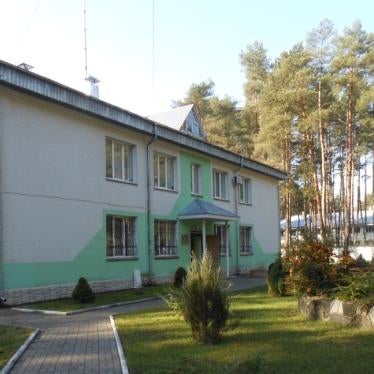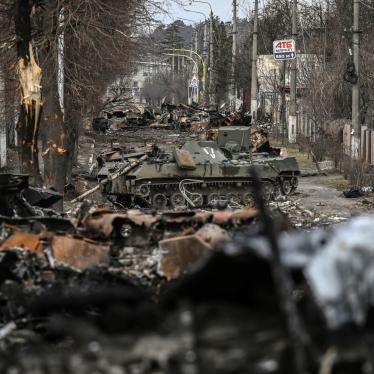President Biden’s announcement that the United States will resettle 100,000 Ukrainian refugees appears on its face to be a positive, straightforward response to the 3 million-plus Ukrainians who have fled the fighting in their country since Feb. 24. Yet, they may not qualify as refugees under U.S. law or under the 1951 Refugee Convention, both of which narrowly define refugees not as people fleeing war but as those who fear being persecuted if returned.
Even if President Biden and the U.S. public have a strong humanitarian impulse to resettle Ukrainian refugees, U.S. refugee law requires individual refugee status determination interviews based on the outdated and overly narrow refugee definition in U.S. law. U.S. immigration officials in Europe interviewing Ukrainians for refugee resettlement and immigration judges considering cases in the United States may find their hands tied.
President Biden could choose an expedient measure, such as humanitarian parole, to bring in Ukrainians, as he did for many of the recently evacuated Afghans. But to stay permanently, they still would need to establish their individual asylum claims based on the same too-narrow refugee definition used for resettlement. In the absence of specialized legislation to enable Afghans and Ukrainian parolees to adjust to permanent resident status, members of both groups risk being denied asylum and face the prospect of deportation or remaining in some legal limbo, potentially for years.
Congress should look beyond the present Ukraine and Afghan emergencies and examine how U.S. refugee and immigration law has failed to recognize people with compelling protection needs and provide a wider scope for protection.
People who are obviously refugees fleeing for their lives may not meet the legal standards established to ensure their protection because of the exclusionary lines embedded in the definition of refugee status. As a result, this status recognizes a relatively narrow category of people deemed deserving of international protection but doesn’t open the door to large numbers of people forced from their homelands by violence and other extraordinary disruptions.
In 1967, the Organization of African Unity recognized the limitations of the Refugee Convention and expanded the refugee definition in Africa to include people fleeing “external aggression, occupation, foreign domination, or events seriously disturbing public order.” Latin American countries followed suit in 1984 with the Cartagena Declaration, which recognized as refugees people fleeing “generalized violence, foreign aggression, internal conflicts, massive violation of human rights or other circumstances which have seriously disturbed public order.”
Thankfully for the Ukrainians now crossing into Poland, Slovakia and Hungary, the European Union (EU) invoked a 2001 law called the Temporary Protection Directive to streamline protection in cases of large groups of people fleeing conflict. In 2004, the EU established what it called “subsidiary protection” for individuals fleeing “situations of international or internal armed conflict,” among other reasons.
But beyond the EU, Africa and Latin America, there is no universally accepted complementary standard of protection that would apply to victims of war and generalized violence. From Eastern Europe through the Pacific, the Middle East and North America, there is no agreed-upon standard for protection broader than the Refugee Convention definition. U.S. refugee law closely mirrors the international Refugee Convention definition, and U.S. case law often has rejected Central American and other asylum seekers fleeing life-threatening conflicts, finding that generalized violence is not a ground for U.S. asylum.
After the Ukraine war erupted, the Biden administration designated Ukrainians for temporary protected status (TPS), as it did earlier for Afghans. But unlike the temporary protection regime in the EU, which flexibly and effectively provides three years of protected status for newly arriving Ukrainians, in the United States TPS applies only to people who were here at the time of the designation; it is of no help to any Ukrainian trying to enter the U.S. after March 1, 2022. For example, the U.S. has designated Haitians for TPS, but continues to expel and deport Haitians who arrived after the date of the designation, even though Haiti is equally unsafe for anyone to return to regardless of when they left the country.
If Congress can agree on anything, it might come up with an ad hoc fix to enable the U.S. exceptionally to allow Ukrainian parolees to adjust to permanent resident status, though it has yet to provide a path to permanent residency for the tens of thousands of Afghans paroled six months ago. It would be far better to fix the law that long has hamstrung the U.S. in providing protection to those who genuinely need it.
The Ukraine humanitarian emergency should spur Congress to enact a complementary protection standard that would extend the concept of asylum beyond protecting only people fearing persecution to enable the U.S. to protect those who would face a serious threat to life or limb because of violence or exceptional situations. This is needed not only for the Ukrainians fleeing war, but also for others fleeing conflict and disasters who similarly need protection but may fall outside the exclusionary legal walls that leave them in danger.









